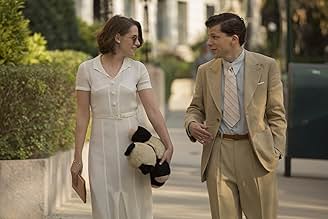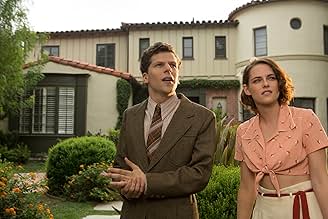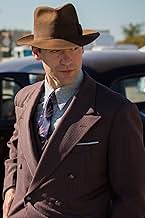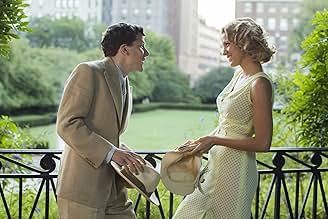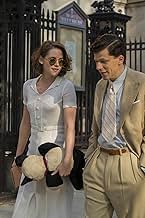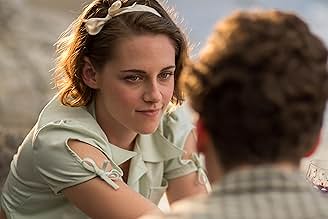IMDb रेटिंग
6.6/10
84 हज़ार
आपकी रेटिंग
1 9 30 के दशक में, एक ब्रोंक्स मूल निवासी हॉलीवुड चला जाता है और एक युवा महिला के साथ प्यार में पड़ जाता है।1 9 30 के दशक में, एक ब्रोंक्स मूल निवासी हॉलीवुड चला जाता है और एक युवा महिला के साथ प्यार में पड़ जाता है।1 9 30 के दशक में, एक ब्रोंक्स मूल निवासी हॉलीवुड चला जाता है और एक युवा महिला के साथ प्यार में पड़ जाता है।
- पुरस्कार
- 8 कुल नामांकन
फ़ीचर्ड समीक्षाएं
Woody Allen often is an interesting and insightful directors, whose films regardless of how they come off overall look great, have great soundtracks and he often knows how to get strong performances out of actors, at his best his writing was a fine mix of the hilarious, the poignantly dramatic and the thought-provoking.
'Café Society' is not one of his best films. Allen's glory days were in the late 60s through to the early 90s, with the 70s and 80s (which saw masterpieces like 'Annie Hall', 'Crimes and Misdemeanours' and 'Manhattan' for example) being particularly good decades. From mid-90s onwards he became hit and miss, with the odd gem like 'Midnight in Paris' and 'Blue Jasmine' but generally his glory days are long gone.
As far as his films from the 2010s decade go, 'Midnight in Paris' and 'Blue Jasmine' are vastly superior but 'Café Society' does fare better than 'To Rome With Love' and 'You Will Meet a Tall Dark Stranger'. 'Café Society' is not a great film, but is not a poor one, generally Allen has done worse (almost all of them being in the last twenty years or so) but it really isn't one of his better films.
Its best asset is the magnificent cinematography, every shot takes the breath away and complements the also spot-on and very handsomely produced 30s period detail perfectly. The soundtrack also is an ideal fit, giving a real sense of period as well as being a wonderful soundtrack on its own. There are shades of prime-Allen writing, there are some very funny moments, some touching ones and it does evoke thought afterwards, Allen's themes done in an insightful way.
The story is simple but rarely dull, it is a long way from perfect as will be detailed later on in the review but it did maintain interest. It's nicely directed by Allen. Performances vary. Blake Lively is positively luminous and Steve Carrell shows that he is adept at comedy and drama in a role that requires both extremes. Was very pleasantly surprised by Kristen Stewart, she can not do much for me but this is proof that with good material she can be good, the role could easily have been hardly one at all but Stewart does make the role more interesting than he deserved to be.
Jesse Eisenberg didn't work for me, he just plays a younger Woody Allen alter ego and it just comes off as a bad impersonation without being either funny or charming, instead it's annoying and the neuroses are overdone. Corey Stoll also feels very out of place, didn't buy him for a minute as a mobster, the role didn't suit him in the first place and it didn't fit within the period.
On top of this, the script and story execution aren't perfect. Mostly the script is very enjoyable but some jokes, especially the bad-taste and insensitive poking fun at Jews, do fall flat. Allen's narration is irritating, overused and over-explanatory, more show and less tell please Allen, consequently giving 'Café Society' an overwritten feel. The story does suffer from too much crammed in and sketchily developed characters (making the central relationships not quite as convincing as they ought to have been), and while there was no problem with a more morose at the end the ending just felt too inconclusive and gave the sense that Allen was indecisive as to how to finish the film.
In conclusion, looks beautiful and has some enjoyable things but somewhat unsatisfying. 6/10 Bethany Cox
'Café Society' is not one of his best films. Allen's glory days were in the late 60s through to the early 90s, with the 70s and 80s (which saw masterpieces like 'Annie Hall', 'Crimes and Misdemeanours' and 'Manhattan' for example) being particularly good decades. From mid-90s onwards he became hit and miss, with the odd gem like 'Midnight in Paris' and 'Blue Jasmine' but generally his glory days are long gone.
As far as his films from the 2010s decade go, 'Midnight in Paris' and 'Blue Jasmine' are vastly superior but 'Café Society' does fare better than 'To Rome With Love' and 'You Will Meet a Tall Dark Stranger'. 'Café Society' is not a great film, but is not a poor one, generally Allen has done worse (almost all of them being in the last twenty years or so) but it really isn't one of his better films.
Its best asset is the magnificent cinematography, every shot takes the breath away and complements the also spot-on and very handsomely produced 30s period detail perfectly. The soundtrack also is an ideal fit, giving a real sense of period as well as being a wonderful soundtrack on its own. There are shades of prime-Allen writing, there are some very funny moments, some touching ones and it does evoke thought afterwards, Allen's themes done in an insightful way.
The story is simple but rarely dull, it is a long way from perfect as will be detailed later on in the review but it did maintain interest. It's nicely directed by Allen. Performances vary. Blake Lively is positively luminous and Steve Carrell shows that he is adept at comedy and drama in a role that requires both extremes. Was very pleasantly surprised by Kristen Stewart, she can not do much for me but this is proof that with good material she can be good, the role could easily have been hardly one at all but Stewart does make the role more interesting than he deserved to be.
Jesse Eisenberg didn't work for me, he just plays a younger Woody Allen alter ego and it just comes off as a bad impersonation without being either funny or charming, instead it's annoying and the neuroses are overdone. Corey Stoll also feels very out of place, didn't buy him for a minute as a mobster, the role didn't suit him in the first place and it didn't fit within the period.
On top of this, the script and story execution aren't perfect. Mostly the script is very enjoyable but some jokes, especially the bad-taste and insensitive poking fun at Jews, do fall flat. Allen's narration is irritating, overused and over-explanatory, more show and less tell please Allen, consequently giving 'Café Society' an overwritten feel. The story does suffer from too much crammed in and sketchily developed characters (making the central relationships not quite as convincing as they ought to have been), and while there was no problem with a more morose at the end the ending just felt too inconclusive and gave the sense that Allen was indecisive as to how to finish the film.
In conclusion, looks beautiful and has some enjoyable things but somewhat unsatisfying. 6/10 Bethany Cox
Director/writer Woody Allen's latest film can be seen as one of his most personal films to date. Dialed to the bright, nostalgic feel of Radio Days (1987), Cafe Society nevertheless reels from an undercurrent of existential authenticity a la Husbands and Wives (1992) poetically and often ruefully addressing the feeling of having lost the road not taken.
Our protagonist is young up-and-comer Bobby Dorfman (Eisenberg), a New Yorker, whose dreams of making it in Hollywood rests uneasily over some very scrawny shoulders. At first he's aided by his Uncle Phil (Carell), an agent and powerhouse among the coastal elite. He sets him up as an assistant and script-reader. Bobby's family dutifully keeps tabs on him back in New York as he climbs the slippery ladder of Hollywood's well-to-do, finding friends in Steve (Schneider) and Rad Taylor (Posey) who have a hand in controlling the talent pipeline from coast to coast. His closest friend and eventual paramour however is Vonnie (Stewart) a comparatively down to earth secretary who would rather bask in the glow of the warm sun then in glitzy opulence. He idolizes her, pines for her despite her insistence that she has a boyfriend; an older man as we later find out.
Woody Allen himself provides the narration for this gentle nostalgia tour through Golden Age Hollywood. Much like his voice, the film feels warm, familiar if sadly slow and blunted. Lacking the consistently snappy tone of earlier works, Cafe Society leans a little too heavily on the love triangle, which granted, captures some excellent drama but is singed from overcooking. When we are rewarded with the usual delights of Allen's repertoire, it all comes out banal, like a list of axioms repeated one too many times.
Yet despite lacking the verbal excitement of Allen's prized filmography, Cafe Society more than delivers in gorgeous cinematography, characterization and themes which are glamorously brought to life by a talented cast. Steve Carell's natural amiability allows us to more easily welter in Phil's more unsavory character decisions which includes having his nephew wait in the waiting room of his office for weeks. He's an agent but he lacks the boorishness of Ari Gold. He believes in what he's selling, and given the way he name- drops by the poolside and the fondness industry insiders seem to have for him, you can tell he's good at what he does. Jesse Eisenberg brings the same frazzled nudnik buoyancy he previously brought to Allen's To Rome with Love (2012). It's easy to see why Eisenberg is a repeated player, the man brings all the trappings of Woody's old characters only with a slightly stronger edge.
If there's one standout however it would have to be Kristen Stewart who resists being the flavorless object of affection. Goodness knows it could have been easy given the time period of the film (not to mention her previous role in the Twilight Series (2008-2012)), but her strident autonomy keeps us invested. She's a piece of Citrine amid fool's gold, a girl next door above the ostentatiousness of industry fugazi. A girl to bring home to mamma.
Much of Bobby's character develops between the intoxicating glamour of Hollywood and the provocative corruptibility of New York City. The dichotomy has a night and day quality that is mirrored by the earthy Vonnie and the glittering Veronica (Lively) who appears later in the film. Large swaths of the movie take place in the Big Apple, much of which concentrates on the foibles of Bobby's sister (Lennick), brother-in-law (Kunken) and mobster brother (Stoll). Far from being unnecessary asides, these stories aptly meld into the film's large themes: love, respect and regret.
With the denseness of a novel and the light touch of Allen's finest, a question the emerges; what is the director trying to tell us through this story? Bobby's balance between the two cities he calls home, mimics Woody Allen's long, illustrious trajectory as a member of the New York intelligentsia and a Hollywood staple. Perhaps he's trying to tell us our problems may seem significant to us and every choice we make means another choice has been deferred, yet in the grand scheme of things, life is ultimately a comedy.
Our protagonist is young up-and-comer Bobby Dorfman (Eisenberg), a New Yorker, whose dreams of making it in Hollywood rests uneasily over some very scrawny shoulders. At first he's aided by his Uncle Phil (Carell), an agent and powerhouse among the coastal elite. He sets him up as an assistant and script-reader. Bobby's family dutifully keeps tabs on him back in New York as he climbs the slippery ladder of Hollywood's well-to-do, finding friends in Steve (Schneider) and Rad Taylor (Posey) who have a hand in controlling the talent pipeline from coast to coast. His closest friend and eventual paramour however is Vonnie (Stewart) a comparatively down to earth secretary who would rather bask in the glow of the warm sun then in glitzy opulence. He idolizes her, pines for her despite her insistence that she has a boyfriend; an older man as we later find out.
Woody Allen himself provides the narration for this gentle nostalgia tour through Golden Age Hollywood. Much like his voice, the film feels warm, familiar if sadly slow and blunted. Lacking the consistently snappy tone of earlier works, Cafe Society leans a little too heavily on the love triangle, which granted, captures some excellent drama but is singed from overcooking. When we are rewarded with the usual delights of Allen's repertoire, it all comes out banal, like a list of axioms repeated one too many times.
Yet despite lacking the verbal excitement of Allen's prized filmography, Cafe Society more than delivers in gorgeous cinematography, characterization and themes which are glamorously brought to life by a talented cast. Steve Carell's natural amiability allows us to more easily welter in Phil's more unsavory character decisions which includes having his nephew wait in the waiting room of his office for weeks. He's an agent but he lacks the boorishness of Ari Gold. He believes in what he's selling, and given the way he name- drops by the poolside and the fondness industry insiders seem to have for him, you can tell he's good at what he does. Jesse Eisenberg brings the same frazzled nudnik buoyancy he previously brought to Allen's To Rome with Love (2012). It's easy to see why Eisenberg is a repeated player, the man brings all the trappings of Woody's old characters only with a slightly stronger edge.
If there's one standout however it would have to be Kristen Stewart who resists being the flavorless object of affection. Goodness knows it could have been easy given the time period of the film (not to mention her previous role in the Twilight Series (2008-2012)), but her strident autonomy keeps us invested. She's a piece of Citrine amid fool's gold, a girl next door above the ostentatiousness of industry fugazi. A girl to bring home to mamma.
Much of Bobby's character develops between the intoxicating glamour of Hollywood and the provocative corruptibility of New York City. The dichotomy has a night and day quality that is mirrored by the earthy Vonnie and the glittering Veronica (Lively) who appears later in the film. Large swaths of the movie take place in the Big Apple, much of which concentrates on the foibles of Bobby's sister (Lennick), brother-in-law (Kunken) and mobster brother (Stoll). Far from being unnecessary asides, these stories aptly meld into the film's large themes: love, respect and regret.
With the denseness of a novel and the light touch of Allen's finest, a question the emerges; what is the director trying to tell us through this story? Bobby's balance between the two cities he calls home, mimics Woody Allen's long, illustrious trajectory as a member of the New York intelligentsia and a Hollywood staple. Perhaps he's trying to tell us our problems may seem significant to us and every choice we make means another choice has been deferred, yet in the grand scheme of things, life is ultimately a comedy.
The plot of the latest Allen's movie is your basic love triangle, set in the 30s and with a small twist. Eisenberg and Stewart play the two young lovers, Bobby and Vonnie, who meet in Hollywood, where Bobby moved from New York.
Bobby's uncle, Phil, is a big shot in the movie industry and Bobby is looking for a job. Vonnie is Phil's secretary and part of her job is to make Bobby feel at home. After a few months, Bobby realizes is not happy on the West Coast, but he is in love with Vonnie.
Bobby proposes to Vonnie and asks her to move to New York with him. But she has a "secret" lover, who also proposes. Bobby moves back to New York alone, to work in his gangster's brother night club. The denouement of their love story is melancholic.
I am not a fan of Stewart, but her part required some aloofness and mystery and she did a good job - whether because she is a good actress or because her range is limited to playing cold and detached I cannot say. Also, the movie offers some classic Allen's punchlines, about life, its meaning or lack thereof. The voice-over did not disturbed me a bit and, as usual, the soundtrack is fabulous. Since I start to feel Allen's nostalgia for the past, this movie fulfilled all my expectations.
If you like Allen's movies, you will probably like this one, too. It is nostalgic but not sentimental and elegant in an old-fashioned way.
Bobby's uncle, Phil, is a big shot in the movie industry and Bobby is looking for a job. Vonnie is Phil's secretary and part of her job is to make Bobby feel at home. After a few months, Bobby realizes is not happy on the West Coast, but he is in love with Vonnie.
Bobby proposes to Vonnie and asks her to move to New York with him. But she has a "secret" lover, who also proposes. Bobby moves back to New York alone, to work in his gangster's brother night club. The denouement of their love story is melancholic.
I am not a fan of Stewart, but her part required some aloofness and mystery and she did a good job - whether because she is a good actress or because her range is limited to playing cold and detached I cannot say. Also, the movie offers some classic Allen's punchlines, about life, its meaning or lack thereof. The voice-over did not disturbed me a bit and, as usual, the soundtrack is fabulous. Since I start to feel Allen's nostalgia for the past, this movie fulfilled all my expectations.
If you like Allen's movies, you will probably like this one, too. It is nostalgic but not sentimental and elegant in an old-fashioned way.
In my humble opinion most Woody Allen movies have a feel but some you can feel more than others and I do believe this is one of those stronger ones. Im sure it has something to do with the beautiful cinematography, scenery and costumes but also the love story was just so believable and Jessie Eisenberg and Kristen Stewart were just so genuine. Funny I don't normally even like those two actors but put them in a Woody Allen movie and it's a whole new performance. Lastly, I couldnt help but notice that most reviews on here are really good or really bad and that's most likely because you either get his movies or you don't. And I really got this one.
Really nice pic of the thirties.
Beautiful paintings but... something is missing the creepy family deserved more...
They were funny but not important enough it seems
क्या आपको पता है
- ट्रिवियाThis is the first film since Twilight (2008) that Kristen Stewart had to audition for to win the role.
- गूफ़When Bobby comes to Phil's house and Phil tells him he is getting a divorce, there is a brief glimpse of the modern-day LA skyline in the upper right hand corner of the screen behind Phil.
- साउंडट्रैकI Didn't Know What Time It Was
Composed by Richard Rodgers & Lorenz Hart
Performed by Benny Goodman and His Orchestra
Courtesy of RCA Records
By arrangement with Sony Music Licensing
टॉप पसंद
रेटिंग देने के लिए साइन-इन करें और वैयक्तिकृत सुझावों के लिए वॉचलिस्ट करें
- How long is Café Society?Alexa द्वारा संचालित
विवरण
- रिलीज़ की तारीख़
- कंट्री ऑफ़ ओरिजिन
- आधिकारिक साइटें
- भाषाएं
- इस रूप में भी जाना जाता है
- Cafe Society
- फ़िल्माने की जगहें
- उत्पादन कंपनियां
- IMDbPro पर और कंपनी क्रेडिट देखें
बॉक्स ऑफ़िस
- बजट
- $3,00,00,000(अनुमानित)
- US और कनाडा में सकल
- $1,11,03,205
- US और कनाडा में पहले सप्ताह में कुल कमाई
- $3,59,289
- 17 जुल॰ 2016
- दुनिया भर में सकल
- $4,37,63,247
- चलने की अवधि
- 1 घं 36 मि(96 min)
- रंग
- ध्वनि मिश्रण
- पक्ष अनुपात
- 2.00 : 1
इस पेज में योगदान दें
किसी बदलाव का सुझाव दें या अनुपलब्ध कॉन्टेंट जोड़ें







